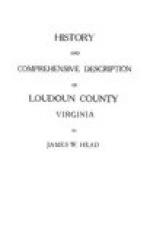" ... while I conducted war on the theory that the end of it is to secure peace by the destruction of the resources of the enemy, with as small a loss as possible to my own side, there is no authenticated act of mine which is not perfectly in accordance with approved military usage. Grant, Sherman, and Stonewall Jackson had about the same ideas that I had on the subject of war.”
Though all his engagements were reported to Stuart till the death of that great cavalry leader, in May, 1864, and afterward to General Robert E. Lee, Mosby was allowed the freedom of untrammeled action in the sense that the operations of his command were left to his individual discretion.
The following militant verses were published in a Southern magazine, soon after the war, and won immediate popularity:
Mosby at Hamilton.
BY MADISON CAWEIN.
Down Loudoun lanes, with swinging
reins
And clash of spur
and sabre,
And bugling of battle horn,
Six score and eight we rode
at morn
Six score and eight of Southern
born,
All tried in love
and labor.
Full in the sun at Hamilton,
We met the South’s
invaders;
Who, over fifteen hundred
strong,
’Mid blazing homes had
marched along
All night, with Northern shout
and song,
To crush the rebel
raiders.
Down Loudoun lanes with streaming
manes
We spurred in
wild March weather;
And all along our war-scarred
way
The graves of Southern heroes
lay,
Our guide posts to revenge
that day,
As we rode grim
together.
Old tales still tell some
miracle
Of saints in holy
writing—
But who shall say why hundreds
fled
Before the few that Mosby
led,
Unless the noblest of our
dead
Charged with us
then when fighting.
While Yankee cheers still
stunned our ears,
Of troops at Harper’s
Ferry,
While Sheridan led on his
Huns,
And Richmond rocked to roaring
guns,
We felt the South still had
some sons,
She would not
scorn to bury.
Battle of Leesburg[32] ("Ball’s Bluff"[33]).
“After the first battle of Manassas, Col. Eppa Hunton had been ordered to reoccupy Leesburg with his regiment, the Eighth Virginia. A little later Col. William Barksdale’s Thirteenth Mississippi, Col. W.S. Featherstone’s Seventeenth Mississippi, a battery, and four companies of cavalry under Col. W.H. Jenifer were sent to the same place, and these were organized into the Seventh Brigade of the Confederate Army of the Potomac, which, early in August, was put under command of Brig.-Gen. Nathan G. Evans, who had been promoted for his brave conduct July 21st. General Beauregard’s object in locating this strong force at Leesburg was to guard his left flank from a Federal attack by way




